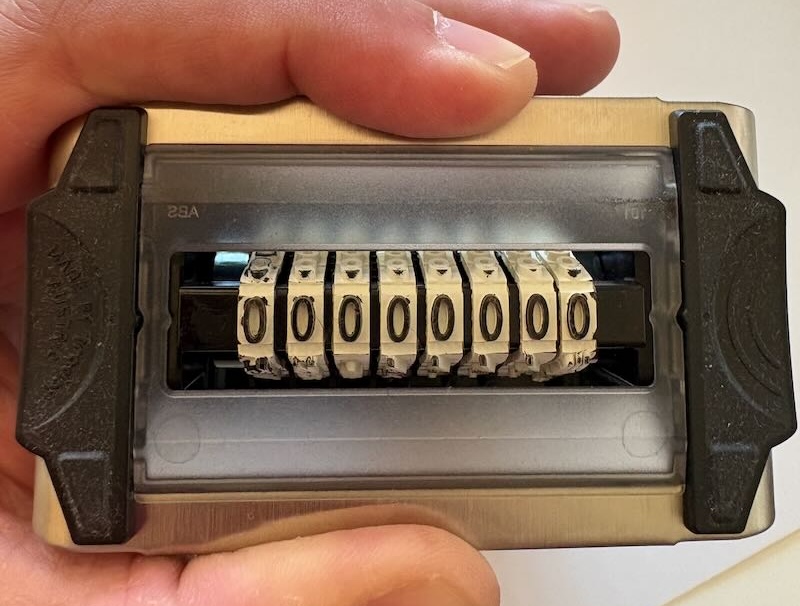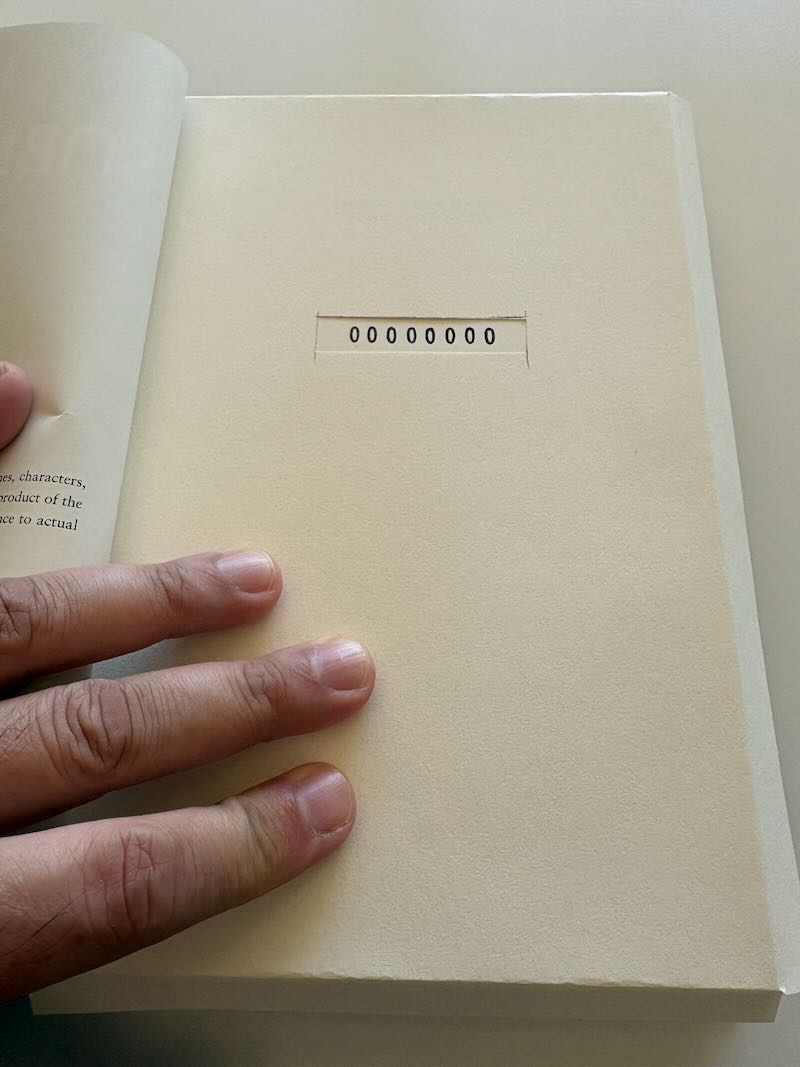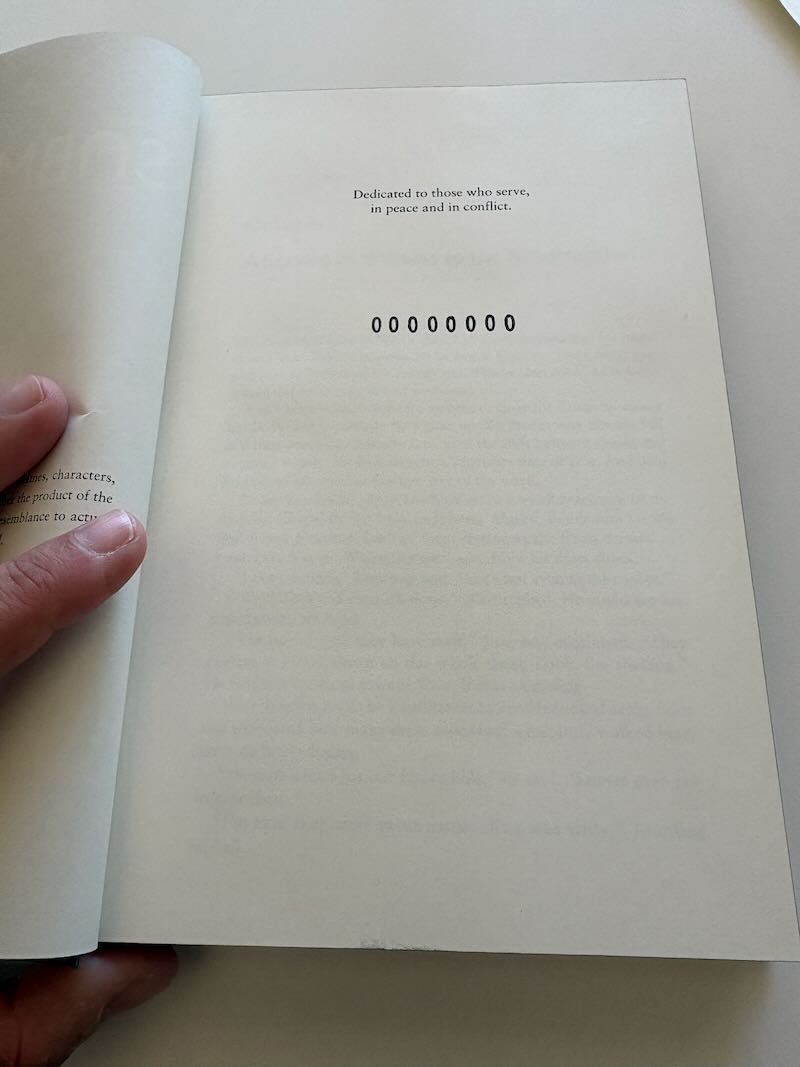Five trends inspiring my fiction, and numbering the Binary Release
Welcome to the August issue of Hacker Chronicles!
I noticed the opening line of my last issue said January, right after wishing y'all Happy 4th. I wonder if that was autocorrect or a wild typo?
In this issue, you'll see how I numbered the Binary Release of Submerged.
Then I'll reflect on five trends in real life today that inspire my writing. I'll share where I imagine those trends going, and you'll recognize some of it from my books.
Enjoy!
/John
Writing Update
If you've already read Submerged, please consider rating it or writing a review on Goodreads or Amazon. It helps me find new readers. Thanks!
The Binary Release
I numbered, signed, and started shipping the Binary Release of Submerged. Everyone who ordered will get an email when their copy has shipped.

Stacking books on the desk to get ready.

Cutting out a window from a thick paper template to get the numbers placed consistently, straight, and without smudges.

Setting the numbering stamp to 00000000 for the first copy.

The first copy stamped.

The first copy without the template.

The first three copies, numbered 00000000, 00000001, and 00000010.
I hit a setback when I went to get pricing for various shipping options with all the packaging material and the book itself. Our local post office was in a dire state.
Our Post Office is Gone!
As I approached our local post office, I found it closed and boarded up. At first I thought, "Oh, no, did they close it because of lack of funding?" I took a photo and sent to my wife who pointed out that the side of the roof looked charred. Indeed, it did! There had been a fire.
NBC Bay Area had some initial reporting.
Suspect Arrested After Car Crashes Into Post Office Setting It Ablaze
A car slammed into a post office in San Jose, California, early Sunday morning, sparking a fire and prompting a police response that led to one suspect being taken into custody.
The San Jose Fire Department (SJFD) said in a Sunday social media post that it responded to a fire around 3 a.m. local time.

A photo from when the fire was ongoing.
It sounded strange because our post office has its own parking lot behind a row of trees towards the street, so there's no way to accidentally crash into it.
More details emerged later that day. Luckily, no one had been hurt, but the suspect had spread instalogs and lighter fluid throughout his car, backed it into the lobby of the post office, exited the vehicle, and lit the whole thing with a match. Then he live-streamed the fire on YouTube.

The entrance of the post office after firefighters put the fire out.

A close-up of the entrance with the burned-out vehicle.
Turns out the perpetrator was the mentally ill younger brother of former NFL star Pat Tillman. Pat went to the same schools as our kids and tragically died of friendly fire in Afghanistan (he left NFL to serve post 9/11).
His brother blames the US government for Pat's death, and the attack on a US post office seems to have been an attack on that same government.
Reviewing the Audio Version of Submerged
I completed the review of the audio version of Submerged and my narrator has re-recorded the chapters and bits we agreed needed to be reworked. I'm about a third of the way through the re-review of those.
August Feature: Five Trends Inspiring My Fiction
Spoiler alert: There are some minor spoilers where I refer to my novels. Nothing profound, all quite small and unrelated to the plots.
1. Internet Balkanization, or Splinternet
China and Russia already have sovereign internets. China with its Great Firewall and Russia with its Sovereign Internet Law.
Researchers in the US invented the internet and a researcher in Europe invented the web. Those two spheres got a huge head start and arguably shaped the technology to their liking.
In my fiction and prediction of the future, I think we'll get truly balkanized internets for all major powers, and possibly some for groups of countries such as Southeast Asia. Then there will be a minority part of the internet that's still accessible globally and only restricted in countries that censor. So I think the general Balkanization will be about shutting others out, not restricting one’s population.
Once we're in such a splinternet future, travel will change, and relocation between spheres will change significantly. We already see some of this in the licensing of digital content. Streaming music and video have different things available in different parts of the world, hearkening back to DVD region codes.

A world map of the DVD region codes.
Digital content may be tied to government identities, and dual citizenship can turn out to be very powerful. Gaming such a system will require much more than a VPN with an egress in your desired region. Your ID and means of payment will be tied to a region.
2. Online Dating
I can't claim to have recent personal experience with online dating, but I'm keenly interested and read quite a lot about it.
AI has already entered the scene, both with AI partners and with various enhancements to how we present ourselves online. As those of you who've read my books know, I predict that daters will not only create bot versions of themselves but that it will be viewed as natural and possibly even mandated. And I totally think AI models will be chatting with other AI models in a 24/7 search for matches.
I also think you'll be required to create a 3D model of yourself at an official scanning place so that others can get an accurate impression of your physical being. Some will balk at this, but really it's just a step back to pre-internet. There were some phone dating services, but for the masses, you started out seeing each other somewhere.
The matching algorithms are an interesting aspect. No doubt they can become uncannily accurate. But for that, they need access to our true feelings and lusts. How can an algorithm know what you're looking for unless you give it access to data that will reveal that? I don't mean that you have to tell it everything, but it needs deep enough access to do lookalike analysis and connect the dots.
I recall an acquaintance who fifteen years ago downloaded the whole database of female online dating users in a major US city and performed Bayesian inference to filter out the best candidates to date. The modeling discovered that he didn't like openly religious women, something he would not admit publicly.
Going further into the future, some young people will discover that they have a very small market of matches in a much clearer way than dating on Match being a challenge. They'll be faced with sheer numbers. The services will suggest how they can change themselves and how much that would improve their chances. Changes can include relocating or learning a new language.
Then again, some think we'll just switch to relationships with robots.

A still from the movie Ex Machina.
3. Drones
Russia's full-scale invasion of Ukraine and how that conflict has developed has told us all that the future of warfare and defense will be very much about drones and automation.
I recently read Kill Decision by fellow hacker fiction author Daniel Suarez. That novel and Suarez's original two-book series Daemon and Freedom(tm) explore drones and swarms of drones.
Isaac Asimov's first law of robotics stipulates that robots may not harm humans. Automating the act of killing is of course a huge ethical question. The speed at which things are developing feels like we'll just ignore that question and race towards cheap killing swarms.
However, the goal of many wars is not to kill but to claim land, power, and control. If the main thing standing if the way of such a victory is the defender's own drones, it makes more sense to have one's drones fight the defending drones than to kill humans.
Again, we arrive at AI vs AI rather than AI vs human.
DARPA conducted the AlphaDogfight Trials 2019–2020 where eight teams developed AI pilots using F‑16 simulators that would compete against each other. The best AI then went on to face a top human fighter pilot. The AI beat the human 5–0. AI doesn't have to care about G forces and doesn't try to save its own life. Once such AI systems are in place, no one will prefer human pilots in the air force, and no human pilots will want to fly.

Wikipedia: Dogfight between 2 F-16s in simulation software; the pilots in this case are AI programs who are fighting for the chance to engage with a human pilot. The trajectories of the aircraft are denoted in pink and blue, as are the scores of the engagements.
How does an aggressor claim land if they're using drones and AI? Some still say that eventually the attacker has to move in humans to take over territory. Which brings us to purely virtual conflicts …
4. Virtual Conflicts
If it's not about land or other physical things, a conflict can take place purely virtually. We may get to a point where computer systems are so crucial that cyber dominance may force a defending country to surrender without any territorial intrusion.
You can even envision territory in the virtual world, currently in the form of cloud servers and computing power. At any point in time, there's a limited amount of such cyber territory. You can fight over it, control it, or destroy it. But the territory simultaneously exists in the real world as servers and networks. You can physically destroy computing power.

The movie Tron from 1982 features fights completely in a virtual world. I will review it in a forthcoming newsletter.
West's NSA hack is only mentioned in Identified and Submerged but I have written it. I'm considering releasing it as a prequel, and it does feature a physical attack.
Of course, part of the splinternet trend is to limit an enemy's capability to attack and own your cyber assets. But an attacker can operate behind defense lines just as in the real world. My novel Submerged explores that.
5. Cyber as an Unregulated Domain of War
The seminal nonfiction book Sandworm covers how none of the nation states with serious cyber powers want to regulate cyber conflict in a way similar to the Laws of War. The author Greenberg's conclusion is that they all believe they are better off using maximum cyber force.
The cover of the book "Sandworm" by Andy Greenberg.
The cyber domain is so far heavily asymmetrical in that it's much easier to attack than to defend. Software in general simply hasn't reached a good level of resilience.
My writing explores how that may play out, for instance in how a single individual or a small group of hackers can penetrate the most sacrosanct places or overthrow global systems.
One aspect of hacking makes it very different. Once the defender knows about a novel attack, they can patch the vulnerability and permanently defang that attack. That is in stark contrast to defense against kinetic warfare.
Currently Reading
July and August have featured my first 3-day fast, birthday parties, friends visiting from overseas, and an epic decluttering and cleansing of both our garage and our basement. Yes, spraying with 10% bleach solution was part of it. That’s the kind of thing you do zero or one time in your life.
That's all to say that I have had little time or energy to read. I'm still reading Silas Marner: The Weaver of Raveloe and The Dragon Lord.
